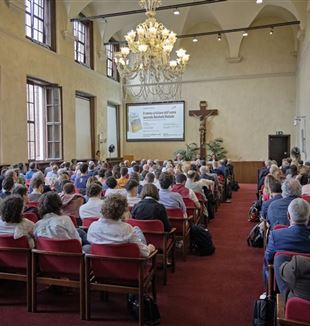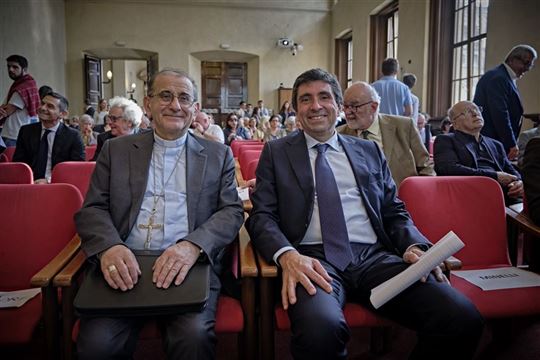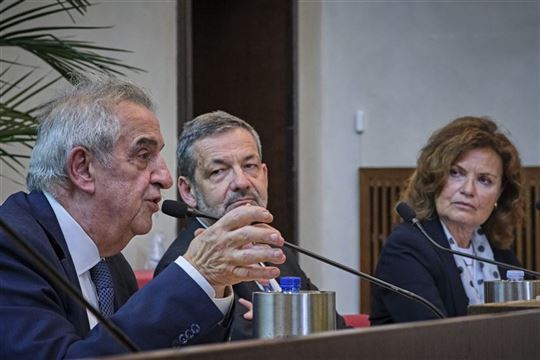
Giussani-Niebuhr: Generative thought, authentic sonship
The presentation of the book of Fr. Giussani’s doctoral thesis at the Catholic University in Milan. Speakers included the Archbishop of Milan, Mario Delpini, and rector emeritus, Lorenzo Ornaghi, among others.The first ‘episode’ that Fr. Enrico Castagna, rector of the Archdiocesan Seminary of Milan, recalled was from the 1940s, a suggestion to better understand the ecumenical openness and passion for the unity of the Church that was breathed in Venegono when “the young seminarian Giussani presided over one of the interest groups, Saint Josaphat for the unity of the Church.” Already then, he explained, “one could grasp his interest and desire to embrace and value the riches of the Protestant and Orthodox worlds.” Another ‘episode’ spoke of the “experience of the incarnation.” Castagna recounted “the well-known run with Enrico Manfredini” down the staircase leading to the chapel. That day, Manfredini stopped Giussani and said: “That God became man is something of the other world.” Giussani retorted, “In this world. A thing of the other world, in this world.”
The rector of Venegono was not physically present at the event on June 11 in the Pius XI Hall of the Catholic University of Milan for the presentation of Il senso cristiano dell’uomo secondo Reinhold Niebuhr [The Christian Meaning of Man According to Reinhold Niebuhr] Fr. Giussani's unpublished doctoral dissertation in theology, edited by Monica Scholz-Zappa. The thesis was completed exactly 70 years ago, on June 23, 1954. But in the letter sent by the rector, and in the addresses of the other speakers, starting with the Archbishop of Milan, Mario Delpini, the spirit and importance of the Venegono seminary for Fr. Giussani and for the whole Church became evident. And, Castagna stressed, the publication of his doctoral thesis has been a way to “reciprocate Giussani's gratitude for ‘his’ and our seminary... If today men and women even from other continents know the seminary of Venegono, it is also due to his grateful memories.”
The Catholic University is also an important place, so close to the Basilica of Sant’Ambrogio. The President of the Fraternity of CL, Davide Prosperi, underlined this by thanking Monsignor Delpini who “just a few weeks before had celebrated, in the nearby Basilica of Sant'Ambrogio, the beginning of the Testimonial Phase for the cause of Fr. Giussani’s beatification.” Prosperi pointed out how in the Archbishop’s preface to the book, Delpini called Giussani's thesis “a brave and timely undertaking,” which already outlined the path of future thought and experience. The importance of the book lies not only in its theological interest, which is extremely current and “of a high scientific level, in some ways, avant-garde.” But as Monica Scholz-Zappa pointed out, it offers the possibility of “identifying oneself in a perennial beginning,” in the generative thought of Fr. Giussani, which stems precisely from his sonship with his teachers in Venegono, as he recalled so many times.
Delpini emphasized, with his amiable irony, that “the literary genre of the ‘doctoral thesis’ is not very nice,” but that “this brave enterprise” is not only academic in form. Both because of the personality of the great Protestant theologian, a powerful voice even in public debate in the United States and a figurehead of a realistic reflection “in the face of social pain, of suffering”, and because Giussani’s work responds to the typical “spirit of Venegono,” that is, of a place where we have always “known that we can cross the threshold into the adventure of the knowledge of other faiths, not because we are lost and seek something else,” but because “one has such a deep-rooted persuasion of one's own faith that one can, starting from it, encounter other experiences as well.”
The rector emeritus of the Catholic University, Lorenzo Ornaghi, then had the task of framing the figure of Reinhold Niebuhr (1892-1971), the son of a pastor, who grew up in the Detroit of large factories, where he encountered social suffering and had the opportunity to compare the content of faith with historical and political realities. Ornaghi pointed out that the relationship between truth and politics is crucial in Niebuhr's thought; his first major text is entitled Moral Man and Immoral Society. Equally important is the category of “realism,” also crucial for Giussani, which Niebuhr valued as a concrete way of addressing the role of Christianity with respect to society. From there came books such as Christianity and Power Politics and Christian Realism Political Problems. Scholz-Zappa explained, “we are faced with the courageous dialogue that Giussani engaged in 70 years ago with Niebuhr, whom he described as ‘the greatest thinker in America in the 1930s and 1940s.’”
The first thing to note is Giussani's “empathy with Niebuhr” regarding the American theologian’s acute description of “the dramatic structural condition in which man lives, his being both finite and infinite, limited and continuous aspiration to move beyond the self.” It is one of the most authentic features of Protestant thought, which Giussani interprets “as a demand for a ‘meaning,’ a word that would become crucial to his thought.” The editor notes that, a full three years before the publication of The Religious Sense, Giussani had already used that expression in his thesis, “This bivalent experience... is like the embryo of the religious sense.”
Read also - GS Uganda. With eyes wide open to beauty
But alongside this empathy there was also room for critical judgment, specifically in his pointing out the difference in the interpretation of the nature of Christianity between the Catholic faith and its Protestant “reduction.” According to an acute reading, which Giussani would later develop as a theological judgment and as an educational method, Protestantism “replaces ontological certainty with a psychological experience.” It is a reduction whereby “the Word was manifested in the flesh, but was not made flesh.” Hence a completely different consciousness of the Church, which for Niebuhr is reduced to a “community of contrite believers,” while for Catholics “the Church is Christ the Redeemer conquering time and space,” so that “the absolutely unique redemptive event becomes the great factor in history.”
It is extraordinary to think that the young theologian, in a doctoral thesis, had the capacity to judge the Christian experience from a lived experience of authentic sonship, as all the speakers emphasized, valuing the direct link between the path lived in Venegono and the path to come. A temperament and a method are already evident in the thesis, which was approved magna cum laude. One of the two original copies is kept in the Venegono archives, and the other in the archive of the Fraternity. Double gratitude.